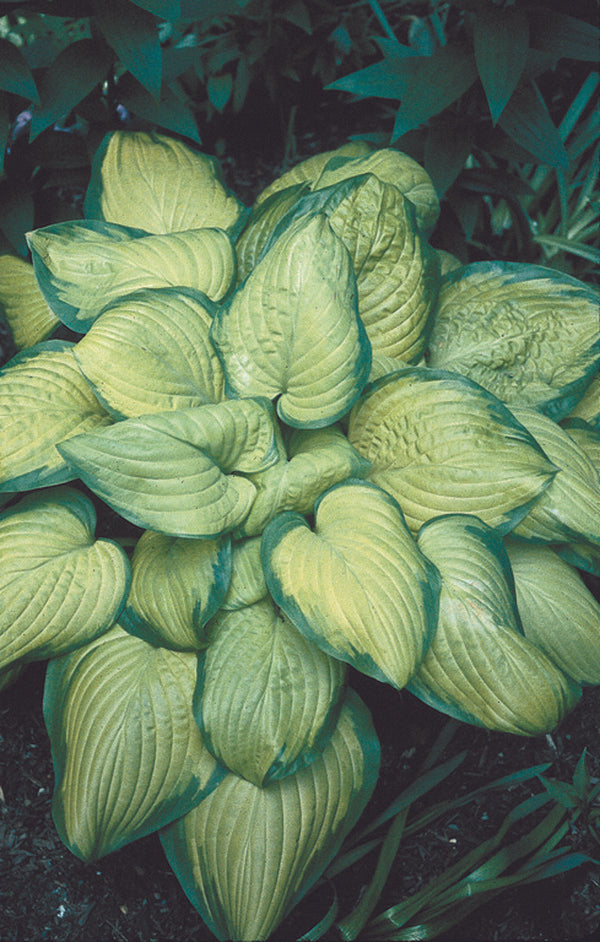Hosta 'Stained Glass'
H. Hansen 99
This plant is not currently for sale. This is an archive page preserved for informational use.
Shop Available HostaItem #: 4232
Zones: 3a to 9b
Dormancy: Winter
Height: 15" tall
Culture: Part Sun to Light Shade
Origin: Hybrid
Hosta 'Stained Glass' is a wildly popular Hans Hansen discovered sport, which is a marked improvement from Hosta 'Guacamole' from which it mutated. The brilliant, shiny, gold foliage is surrounded by a 2" wide dark green margin. This incredibly vigorous sun-tolerant grower makes a 3-4' wide clump with large, lightly fragrant, lavender flowers in midsummer...a hummingbird celebration! In 2006, it was awarded Hosta of the Year honors by the American Hosta Society Growers Association...do not live without this hosta for another day!
Maintenance:
Other than clearing away the dead foliage in fall, it should be a maintenance free perennial. Voles and deer are two pests that will need to be addressed if they are a problem in your area.
If you experience hail on your hosta, they can be immediately cut to the ground, and they will re-flush with new leaves. If the hail occurs late in the summer, you may be better off to just leave the hosta foliage intact instead of force new growth when the plant is preparing to go dormant.
Old hosta flower stalks are best removed for appearance sake, although these have no impact on the growth of health of the plant.
Growing Conditions:
Like all hostas, it thrives in light, open shade, but it is also one of the most sun tolerant hostas, easily thriving in up to 4-6 hours of sun daily, as long as the soil is moist. It will not thrive in deep or very dry shade.
Garden Value:
You'll find that it creates a bright, bold-textured element in the woodland garden. We like to plant this near a path, so the sweet fragrance can be enjoyed during its summer flowering period. The fragrance is strongest in the evening, so locating it near a patio that's used in summer evenings maximizes the value.
Natural Impacts:
Bees are the main pollinators for all hostas, and they are great for attracting these pollinators to your garden.


-
Related Articles
- The Top Hummingbird Attracting Plants for Your Garden
- Gardening in the Shade
- Hosta Breeders and Other Strangers
- Hosta, Hosta, Hosta
- Hostas for Warm Climates
- Hostas - The Fragrant Kind
- Leaves that Light Up the Garden - Variegated Plants
- Hosta Introductions and Breeding by Paul Aden
- Hosta Breeding Program at Plant Delights Nursery
- Soils and Garden Soil Preparation
- Hosta Myths - Tony's Top Ten
- How to Build a Butterfly Garden
- The Myth of Hosta Originator's Stock
-
Other Attributes
Genus: Hosta
Flower Color: Purple/Lavender
Leaf Color: Green , Variegated , Yellow/Gold
Bloom Time: Summer
Container Role: Thrillers
Garden Themes: Cottage Garden Plants , Living Wall , Night Gardens
Other: Bog Garden Plants , Butterfly Attracting Plants , Edimentals , Cut Flower Plants , Fragrant Flowers , Groundcovers , Hummingbird Plants , Pollinator Plants , Medicinal Plants , Plants that Attract Birds , Rain Garden Plants , RHS Award of Merit Winners , Salt Tolerant Seaside Plants , Wet Shade Plants , Colored Foliage , Patterned Foliage


